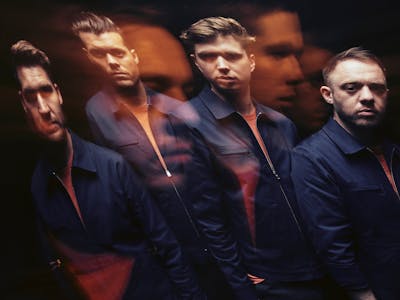Across three albums, immense acclaim and intense adoration, the sound of Everything Everything has remained a volatile beast; a musical bucking bronco, their albums maximalist, frenetic, art-pop juxtapositions of R’n’B and melancholia and Afrobeat, of synths, guitars, falsetto. Critics have written of the frenzy of it, of the sheer sublime sweet sensory overload of it all.
Their fourth album, A Fever Dream, is a quite different prospect: a calibration of chaos and control, the result of a curious desire for consistency. As guitarist Alex Robertshaw puts it: “Our records have been many styles rubbing up against each other, and for the first time I wanted to make a record that was cohesive sonically.”
Midway through touring 2015’s Get To Heaven, Robertshaw found himself listening increasingly to the kind of electronic music he had loved as a teenager — early Warp Records releases, Aphex Twin, Autechre, Boards of Canada, relishing “the atmosphere and the attitude” of them. “I wanted to go back to that thing that first made me excited about music,” he says. “We’ve spent a lot of time going into that R’n’B and hip hop world — for an indie band it was a bit of an untouchable thing, and it was really fun to do and I think we captured it at its best with Kemosabe and Arc. But once you start doing that you kind of separate yourself.”
Contemplating a fourth album, and after an extensive run of touring, Robertshaw felt a need to reconnect with the sounds that had first thrilled him and inspired him to begin making music. “Rather than playing around with styles in a way that’s exciting because you’re playing around with styles, I was thinking ‘What is it that you love about music?’” he explains. For Robertshaw, a lot of that love and excitement lay in electronica. “There’s something that happens when you hear something that’s not a human being making music and still being applied a very kind of human emotional way,” he says. “It’s the idea that electronic music doesn’t just fill a sonic space in a song.” Sitting jetlagged in an hotel room in Minneapolis, writing the very beginnings of what would become A Fever Dream, he began to think of how Everything Everything might try using “a lot of those techniques, bastardising audio in a way that you wouldn’t normally do in a band with four people with guitars.”
This is not to suggest that A Fever Dream is a slavishly electronic record, rather that the band’s impulse was to capture the wonder and magic of first discovering music. “It’s kind of a mixture of the sounds of our adolescence I suppose - the electronic stuff mixed with American heavy bands of the early-mid 90s,” singer Jonathan Higgs explains. “As a result, there’s also a lot of adolescent riffy guitar-playing on the album. Guitar music is really where we came from, all of us. Then we grew up a bit and it went out of fashion, but really that’s what excites us hugely. And because we always had a plan on not being like that early on it feels really good to do it now.”
Capturing adolescent fervour in these songs – “trying to grab the chaos and unpredictability of it” as Higgs puts it, “reminding yourself of picking up a guitar for the first hundred times and not knowing what it was going to do” has been part of the challenge. While bassist Jeremy Pritchard and drummer Michael Spearman joined later in the studio under the watchful eye of producer James Ford (Simian Mobile Disco, Klaxons, Arctic Monkeys) the album began as ever with Higgs and Robertshaw, Everything Everything’s principal songwriters. This has been their most collaborative record to date, the pair working together on every track, with Higgs’s more dramatic pop sensibilities tempered by what he simply describes as Robertshaw’s “cool”.
The bulk of the guitar parts were recorded last in the studio, better to capture the free-fall and glee of them. They have also sought more warmth and breath in the music’s electronic components so that “There’s a lot more life in the synths now,” Higgs explains. “We used to use soft synths, computer plug-ins, and they would get us halfway there and then we would not take it to its fullest extent. This time we’ve built a lot of synth sounds up from the very raw components and really fashioned them into living things that you probably wouldn’t be able to get again if you tried.” Higgs also wrote around 50 per cent of his lyrics in the studio. “Sometimes I’m ad-libbing until the last take and then that’s actually the best thing on it,” he says. “It’s weird, but it’s something we’ve learnt to trust over the last couple of albums.”
The lyrics that spilled out of Higgs were frequently surprising, sometimes unsettling, a reflection of the discordance of the times. “The album as a whole is based around the idea of a fever dream,” he says. “That’s the title, and I think every song has a reference to sleeping or waking or dreaming, or it’s nighttime or it’s dawn, it’s referred to again and again and again. It’s this idea that the world has become very surreal. That’s the force that drags you through the album: what the hell is going to happen next? Is the world ending? These things that we’ve talked about that would never happen, they’re all happening. That’s the feeling that I’ve had for a while. And I think a lot of people have, and wanted the album to feel like that when you put it on - this scary, unknowable reality. I think putting it into a feverish dream is the best way to do that really, because that’s how it feels.”
In many ways A Fever Dream is the logical thematic successor to Get To Heaven’s exploration of rolling news culture — a portrait of a world grown relentless and unfathomable, whatever your nationality or political persuasion. “I really didn’t want to be too explicit about world events,” Higgs says. “Everyone’s pretty aware of what is going on. But I wanted to make a record about how this has all affected us, not just me and you, but everyone around us. I think people come to us for a sense of recognition. They want to hear someone else say what they’re feeling. And that’s what I’ve always gone to music for, and I hope that’s what we put out - the ‘Do you feel like me?’ message, rather than anything more concrete. It doesn’t interest me to be preachy, it just turns everybody off, including me.”
One track, Ivory Tower, is a particularly striking reflection of the times — a spewing-forth of what Robertshaw politely terms “a lot of hugely unacceptable language” in a portrait of an increasingly faceless and impersonal world. “Ivory Tower deals with very extreme stuff,” says Higgs. “It’s a reaction to the nasty side of everything we’ve had lately, like all the stuff on immigration. But I’m not looking at it objectively I’m going right in there and saying lots of awful things that everyone’s saying at each other - so I’m having a go at the liberal elite and I’m having a go at the small-minded racists, all this stuff at the same time. And it’s just this rage, this really fast, violent song. And it’s a way to get all that horrible shit out of us. And when you hear it on the record it does just sound like someone kicking down your door. But I’m not setting out my stall — it’s a photograph of now, a snapshot of how it feels to be alive at the moment.”
While Higgs believes A Fever Dream contains the “most intense” songs Everything Everything have ever written, it also holds moments of great tenderness — the piano-led New Deep for example. “We purposely set out not to have any downtime on the last record, and I think we decided to have some calm on this one,” he explains. “Just because we’re humans and the world is in such turmoil, we needed those moments of introspection.” Robertshaw agrees: “All our records are trying to cover as much ground as possible for our own excitement really,” he says. “We like to have heart-wrenching moments next to complete rage.”
And there is great levity here, too. “There’s moments where it’s tongue-in-cheek or you can just dance to it,” says Higgs. “You don’t actually need to think so deeply.” The title track for instance is “incredibly hypnotic and repetitive, a six minute song that doesn’t stop and is really dancey and we wanted people to be able to lose themselves in it.”
A Fever Dream is a rare and quite remarkable achievement: an album that is charged and political, that takes the temperature of the times, that will surely stand as one of the year’s most important albums, yet on a most visceral level is arresting, beautiful, tender, and thoroughly, irresistibly danceable. It is that exceptional kind of record that demands cerebral, emotional and physical response — as Higgs says: “You shouldn’t be sitting down the first time you hear it.”


